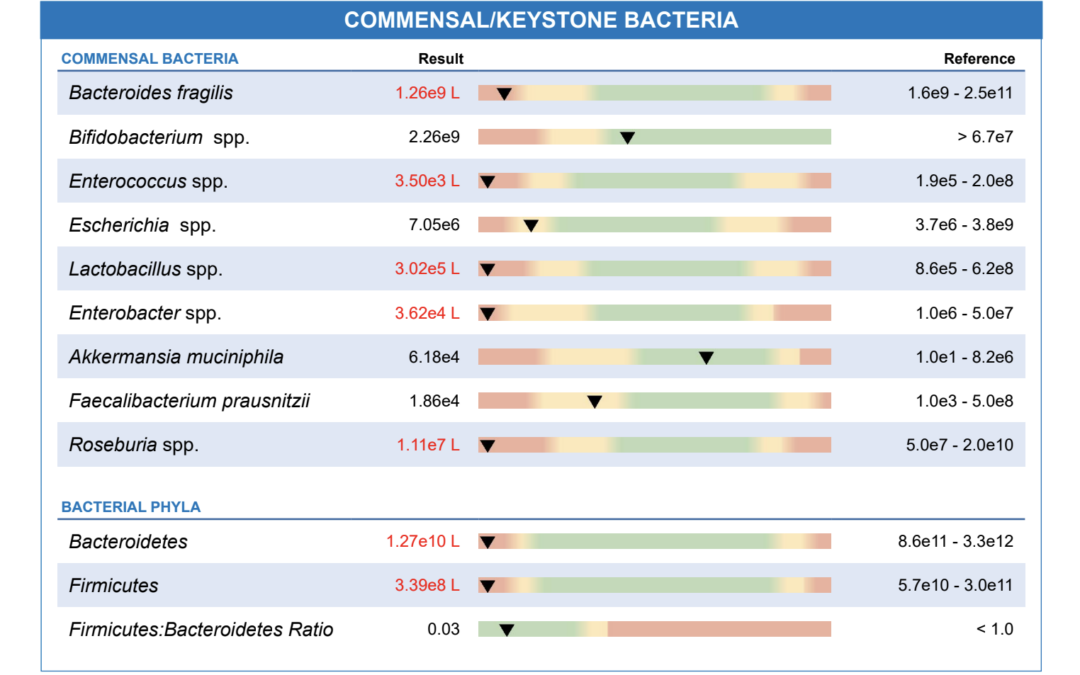Do you immediately run to an antibiotic when you don’t feel well?
Don’t get me wrong, antibiotics can absolutely do good and are needed in certain situations because they kill the “bad” guys in our gut. But unfortunately, they can also kill off the good guys in our gut as well, leading to further GI issues.
Above, you’ll see a GI Map (which is a form of stool testing for the gut that I use in my private practice) from a client who had frequent antibiotic use. What you see in the GI Map is very low commensal or “normal” gut bacteria. When we have low normal gut bacteria, this creates a greater risk for infection, dysbiosis (which is basically just a fancy word for an imbalance of “good” and “bad” bacteria in your gut), overgrowth, intestinal permeability, and poor immunity overall.
One of my first pieces of advice is to take caution and be picky and choosy about when you do use an antibiotic. As a disclaimer, this is not medical advice and you shouldn’t go against your doctor’s orders. Simply stated, the body is incredible at healing itself if you give it time and rest.
At times, though, you do need an antibiotic! So, how can we support our gut when that time comes?
1. Quality probiotic use! The most commonly used and researched probiotics are:
Lacto/Bifido Blends – These probiotics are great if you’re someone who experiences vaginal symptoms while taking an antibiotic, and they can also help with overall GI health. (My Fav Brands: Ther-biotic Complete by Klaire Labs; Ther-biotic ABx Support also combines Lacto/Bidido + S. Boulardii)
Soil-Based / Spore-Forming – These are one of my top picks for frequent antibiotic use, as they greatly support immune function and can also help with stool consistency. (My Fav Brand: Megasporebiotic by Microbiome Labs)
Saccharomyces Boulardii – This probiotic can help specifically with antibiotic-associated diarrhea, so if you’re someone who commonly deals with this, S. Boulardii could be a great pick for you! (My Fav Brands: Jarrow or Seeking Health brand)
2. Support with food! Focus on minimizing added sugars and alcohol. This is a time to focus on lots of diet variety. Get in a wide range of polyphenols from fruits and veggies (especially dark leafy greens and dark-colored fruits for antioxidants), consume enough protein / Omega-3s (aim for 25-30 grams of protein at each meal), and prioritize fibrous carbohydrate intake! Focus on seasonings and spices like turmeric, cinnamon, ginger, onion, garlic, etc. Add in probiotic-rich foods such as yogurt, sauerkraut, and kimchi.
3. Support your intestinal barrier! Antibiotics can increase intestinal permeability, making it easier for bacteria and toxins to enter into the blood stream. For this, you can focus on items like zinc carnosine and mucilaginous herbs like marshmallow, slippery elm, and DGL.
4. Support your liver! Drink plenty of water during this time and add in liver-supportive foods such as berries (blueberries, blackberries, raspberries), dark-leafy and bitter greens, cruciferous veggies (broccoli, cauliflower), beets, grapefruit, Jerusalem artichokes, etc. You can utilize supplements like NAC, milk thistle, or TUDCA if needed (remember – always work with a healthcare professional and never supplement blindly).
5. Most importantly, REST!!! If you are sick and on an antibiotic, your body cannot heal if you’re constantly pushing it.
Wishing you a healthy and happy gut this cold + flu season!
Much love,
Coach Kara

